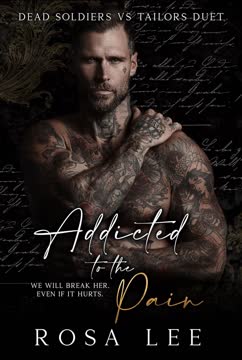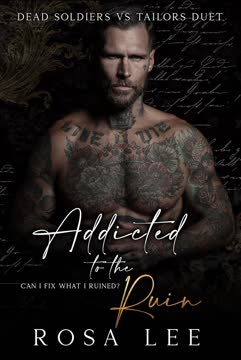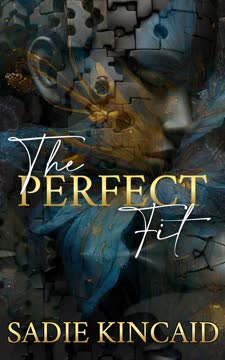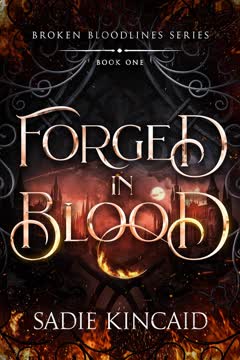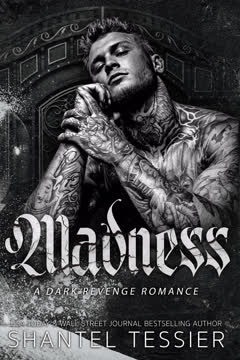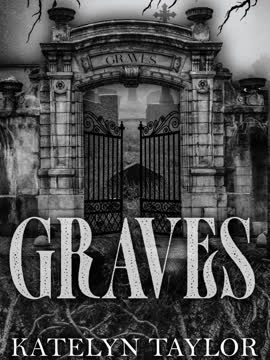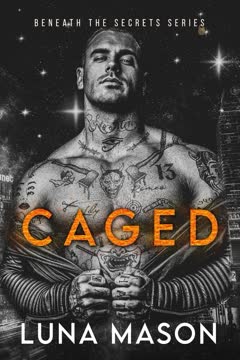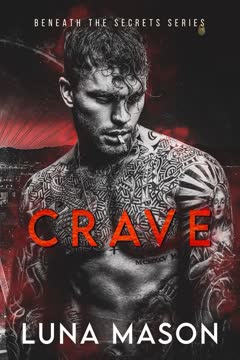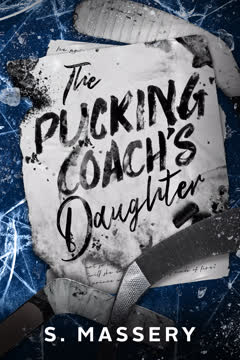Plot Summary
Drip, Darkness, and Desire
Lark, daughter of a rival gang leader, is held naked and tortured in a dungeon by the Tailors, her family's sworn enemies. She clings to her humor and sexuality as shields against despair, mocking her captors and the relentless drip of water that torments her. Despite her wounds and deprivation, she refuses to betray her family's secrets. When Knox, a younger, striking Tailor, enters, their chemistry is immediate and electric. Lark uses her body and wit to gain leverage, and their encounter blurs the line between captor and captive, pleasure and pain. Knox's unexpected tenderness and anger at her injuries hint at cracks in the Tailors' cruelty. Lark's resilience and vulnerability set the stage for a twisted, dark romance where survival and desire are inseparable.
The Devil's Heir Arrives
Aeron, the Tailors' heir, is tasked with breaking Lark. He's haunted by his sister's death and driven by a need for control and vengeance against the Soldiers. Aeron's calculated cruelty is matched by his fascination with Lark's strength. The Tailor brothers—Aeron, Jude, Knox, and Tarl—each bring their own brand of darkness and obsession. Lark is moved from the dungeon to Aeron's room, her wounds tended by Tarl, the Inquisitor. The Tailors' dynamic is volatile, with Aeron's leadership challenged by Knox's protectiveness and Jude's wildness. Lark's presence exposes old wounds and rivalries, especially the unresolved grief over Aeron and Jude's sister, June. The stage is set for psychological games, shifting power, and forbidden attraction.
Broken Birds, Scarred Devils
As Lark heals, she's drawn into the Tailors' world—a converted warehouse filled with danger and desire. Jude, Aeron's brother, is both playful and sadistic, his scars mirroring Lark's own. Their interactions are charged with pain and pleasure, as Jude feeds and teases her, blurring the lines between tormentor and lover. Tarl, the healer and interrogator, tends to her wounds with a gentleness that belies his reputation. Knox is kept at a distance, punished for his earlier intimacy with Lark. The Tailors' obsessions deepen, each man seeing in Lark a reflection of his own brokenness. Lark, in turn, is both terrified and exhilarated by their attention, her trauma and desire intertwining as she navigates their dangerous affections.
Healing, Hunger, and Hunger
Lark's recovery is marked by sensual games and psychological warfare. Jude's playful cruelty and Aeron's cold dominance keep her off balance, while Tarl's care offers fleeting comfort. The Tailors feed her, bathe her, and deny her pleasure, using her hunger—both physical and sexual—as a tool of control. Lark's wit and resilience earn their grudging respect, but also fuel their obsession. The boundaries between captor and captive blur further, as Lark begins to crave the pain and attention they give her. The Tailors' own traumas—Aeron's guilt, Jude's madness, Knox's protectiveness, and Tarl's haunted past—surface in their treatment of Lark, binding them together in a web of need and violence.
Chains, Coffins, and Control
The Tailors escalate their psychological games, locking Lark in a glass coffin as both punishment and test. The darkness and confinement trigger her deepest fears and memories of abuse. Aeron, despite his role as tormentor, soothes her through a panic attack, revealing a capacity for empathy beneath his icy exterior. The Tailors' control is absolute, but cracks appear as their feelings for Lark deepen. The glass coffin becomes a symbol of both her captivity and the twisted care they offer—she is their possession, to be worshipped, destroyed, and remade. Lark's submission is both forced and chosen, her survival dependent on navigating the Tailors' shifting desires and cruelties.
Nightmares and New Obsessions
Lark's nightmares and trauma are mirrored by the Tailors' own haunted pasts. Aeron and Jude's grief over June's death, Knox's guilt, and Tarl's mysterious history create a shared language of pain. Lark's OnlyFans persona and her defiant sexuality become both shield and weapon. The Tailors' obsession with her grows, each man seeking solace and redemption in her brokenness. Lark, in turn, finds herself drawn to their darkness, craving the pain and attention they offer. The lines between love, hate, and need blur, as captor and captive become entangled in a web of mutual destruction and longing.
The Playroom's Painful Games
The Tailors attempt to break Lark through a combination of physical and psychological torture—denying her pleasure, inflicting pain, and using her body as both weapon and reward. The playroom becomes a stage for their darkest desires, with Lark enduring clamps, blindfolds, and forced orgasms. Despite the torment, she refuses to betray her brother or her family's secrets. The Tailors' frustration grows, but so does their admiration for her resilience. The games become increasingly intimate, with lines between punishment and pleasure dissolving. Lark's submission is both a survival strategy and a source of unexpected empowerment, as she learns to manipulate the Tailors' desires to her advantage.
Blood, Ink, and Ownership
Jude tattoos Lark's body with chains and birds, marking her as the Tailors' property. The act is both a violation and a gift, symbolizing her new identity as their possession. The tattooing is painful, but Lark endures it, finding meaning in the birds—symbols of freedom, even as she is chained. The Tailors' own bodies are marked by scars and ink, their pain and history etched into their skin. The ritual of ownership is completed through blood, sex, and violence, binding Lark to the Tailors in body and spirit. The illusion of freedom persists, but the reality of captivity is inescapable.
The Tailors' Ruin Revealed
As Lark becomes more enmeshed with the Tailors, her secrets begin to unravel. The truth of her abuse at the hands of her father's gang is revealed, and the Tailors vow vengeance on those who hurt her. The shared trauma deepens their bond, but also sets the stage for betrayal. Lark's loyalty to her brother and her need for survival force her to make impossible choices. The Tailors, for all their power, are vulnerable to the ruin Lark brings—her presence exposes their weaknesses and threatens to destroy them from within. The stage is set for a reckoning, as love, loyalty, and vengeance collide.
Stables, Hunts, and Huntsmen
A rare respite comes as the Tailors take Lark to their stables, introducing her to their world outside violence. The peace is short-lived, as the men turn the outing into a hunt, chasing Lark through the woods in a primal game of predator and prey. The hunt becomes a metaphor for their relationship—Lark is both pursued and desired, her capture inevitable. The Tailors' possessiveness and need for control are on full display, but so is their capacity for care. The alliances between them shift, with moments of tenderness and brutality coexisting. Lark's role as both victim and temptress is cemented, her fate entwined with the Tailors' own.
The Price of Betrayal
As the Tailors plot to destroy the Soldiers, Lark is caught between her loyalty to her brother and her growing love for her captors. The Tailors promise to protect Rook, Lark's brother, in exchange for her help in infiltrating the Soldiers' headquarters. The tension mounts as the plan takes shape, with Lark's guilt and fear growing. The Tailors' trust in her is absolute, but the threat of betrayal hangs over them all. The cost of survival becomes clear—someone will have to pay, and the price may be more than any of them can bear.
Forgiveness, Fury, and Family
The truth of Aeron's role in Lark's mother's death is revealed, shattering the fragile peace between them. Lark's grief and rage threaten to destroy the bond they've built, but forgiveness becomes a necessity for survival. The Tailors' own family wounds—Aeron and Jude's loss of their sister, Knox's abandonment, Tarl's haunted past—surface, forcing them to confront their own demons. The family they've created with Lark is both a source of strength and vulnerability. Reconciliation is hard-won, but the threat of violence and betrayal remains ever-present.
The Soldier's Darling
Lark's role as the Soldier's Darling—her father's tool for control and reward—comes to the fore. The Tailors learn the full extent of her abuse and vow to destroy those responsible. The plan to infiltrate the Soldiers' headquarters is set in motion, with Lark as the key. The lines between love and loyalty blur, as Lark prepares to betray the men she's come to love in order to save her brother. The stakes are higher than ever, with the fate of both gangs—and Lark's own soul—hanging in the balance.
The Trap is Sprung
The Tailors follow Lark's lead into the Soldiers' lair, only to be ambushed. Lark's betrayal is revealed—she has led them into a trap to save her brother, as her father demanded. The Tailors are captured, their weapons taken, and Lark is brutalized before their eyes. The sense of trust and family is shattered, replaced by rage, grief, and a sense of inevitable loss. Lark's choice is both understandable and unforgivable, her survival bought at the cost of the Tailors' freedom and possibly their lives.
Love, Loss, and Loyalty
In the aftermath of the betrayal, the Tailors are imprisoned, and Lark is left to face the consequences of her actions. The love that once bound them is tainted by loss and anger, but the hope of redemption lingers. Lark's sacrifice is both selfless and selfish, her loyalty to her brother costing her everything she's built with the Tailors. The men, for all their fury, cannot let go of their feelings for her. The story ends on a note of uncertainty, with the promise of further reckoning and the possibility of forgiveness.
The Tailors' Last Stand
The Tailors, stripped of their power and betrayed by one of their own, must find a way to survive and reclaim what was taken from them. The violence that has defined their lives comes full circle, as they prepare for a final confrontation with the Soldiers. Lark's fate is uncertain, her choices haunting both herself and the men she loves. The bonds of family, loyalty, and love are tested to their limits, with the outcome far from certain.
Choices, Chains, and Consequences
The story closes with the consequences of Lark's choices reverberating through the lives of all involved. The chains that once bound her are both literal and metaphorical, symbols of captivity and belonging. The hope for healing and redemption remains, but the scars of betrayal and violence will not easily fade. The future is uncertain, but the possibility of forgiveness and new beginnings lingers, a fragile promise in a world defined by pain and desire.
Characters
Lark (The Soldier's Darling)
Lark is the daughter of the Dead Soldiers' leader, raised in violence and used as a tool for her father's power. Her wit, sexuality, and defiance are shields against a lifetime of abuse, neglect, and exploitation. Lark's psychological complexity is rooted in trauma—her humor and bravado mask deep wounds, and her craving for pain and attention is both a survival mechanism and a source of shame. Her relationships with the Tailors are fraught with danger, desire, and the desperate need for belonging. Lark's loyalty to her brother, Rook, drives her ultimate betrayal, sacrificing her own happiness and the trust of the men she loves to save him. Her journey is one of survival, self-destruction, and the hope for redemption, as she navigates the blurred lines between victim and agent, love and ruin.
Aeron Taylor (The Devil's Heir)
Aeron is the heir to the Tailors, shaped by the violent death of his sister and the burden of leadership. His icy exterior and ruthless command mask a deep well of grief, guilt, and longing for connection. Aeron's need for control extends to his relationships, especially with Lark, whom he both torments and protects. His psychological complexity is rooted in trauma and the pressure to live up to his father's legacy. Aeron's capacity for empathy is revealed in moments of vulnerability, but his inability to forgive betrayal is a fatal flaw. His journey is one of power, loss, and the struggle to reconcile love with vengeance.
Jude Taylor (The Mad Prince)
Jude is Aeron's younger brother, marked by madness, scars, and a penchant for both pleasure and pain. His playful cruelty and wildness are coping mechanisms for the trauma of witnessing his twin sister's murder. Jude's obsession with Lark is both healing and destructive, as he seeks in her a kindred spirit of brokenness. His bisexuality and openness to taboo desires make him both unpredictable and deeply loyal. Jude's psychological arc is one of seeking connection through chaos, using humor and kink to mask his pain. His love for Lark and his brothers is fierce, but his inability to let go of the past threatens to consume him.
Knox (The Protector)
Knox is the Tailors' enforcer, a physically imposing man with a soft heart and a deep sense of responsibility. Orphaned and adopted by the Tailors, Knox's loyalty is absolute, but he is haunted by guilt over the deaths of those he couldn't save, especially June. His protectiveness toward Lark is both nurturing and possessive, and his struggle with his own desires—especially his curiosity about Jude—adds layers to his character. Knox's journey is one of seeking forgiveness, both from others and himself, and learning to accept love despite his violent past.
Tarl (The Inquisitor)
Tarl is the Tailors' interrogator, a man of Middle Eastern descent with a mysterious past and a gift for both healing and inflicting pain. His mismatched eyes and calm demeanor mask a deep well of sorrow and loss, having survived the death of his family and found a new home with the Tailors. Tarl's relationship with Lark is marked by gentleness and understanding, but also by the darkness of his profession. He is the first to sense her impending betrayal, offering forgiveness even as he prepares for the consequences. Tarl's psychological complexity lies in his ability to hold both violence and compassion, serving as both confessor and executioner.
Rook (Lark's Brother)
Rook is Lark's younger brother, the only family she truly loves and the reason for her ultimate betrayal. Used as leverage by their father, Rook's innocence and vulnerability are in stark contrast to the violence surrounding him. He represents both hope for a different life and the chains that bind Lark to her past. Rook's fate is uncertain, but his presence is the catalyst for Lark's most difficult choices.
Rufus Jackson (The Soldier King)
Rufus is the leader of the Dead Soldiers and Lark's father, a man defined by cruelty, control, and the willingness to use his own children as tools. His psychological profile is that of a narcissist and sadist, using violence and sexual exploitation to maintain power. Rufus's manipulation of Lark and Rook is the engine of the story's tragedy, and his rivalry with the Tailors is both personal and generational. He is the embodiment of the cycle of violence and the primary antagonist whose actions drive the narrative's darkest turns.
Adam Taylor (The Tailor Patriarch)
Adam is the head of the Tailors, a man whose expectations and legacy shape Aeron and Jude's lives. His absence and commands from afar create a vacuum of authority, forcing his sons to navigate leadership and loyalty on their own. Adam's psychological impact is felt in the pressure to succeed, the need for vengeance, and the inability to escape the family's violent history.
June Taylor (The Lost Sister)
June, Aeron and Jude's sister, is murdered before the story begins, but her death haunts every character. She represents lost innocence, the cost of gang violence, and the wound that can never fully heal. Her memory shapes Aeron's coldness, Jude's madness, and the brothers' inability to move on. June's absence is a constant reminder of what has been lost and what is at stake.
Earl (The Enforcer)
Earl is the Tailors' second-in-command, a man whose cruelty and ambition make him both a tool and a threat. His role in Lark's torture and the escalation of violence is pivotal, and his presence is a constant reminder of the dangers lurking within the Tailors' own ranks. Earl's psychological profile is that of a predator, thriving on the suffering of others and willing to betray anyone for power.
Plot Devices
Captivity and Stockholm Syndrome
The narrative is structured around Lark's captivity, using the physical and psychological constraints of imprisonment to explore themes of power, submission, and survival. The gradual shift from fear and hatred to desire and attachment is a classic Stockholm Syndrome arc, complicated by the Tailors' own traumas and needs. The dungeon, glass coffin, and playroom serve as literal and metaphorical spaces for transformation, where pain becomes pleasure and enemies become lovers.
Multiple POV and Shifting Alliances
The story employs multiple points of view, allowing readers to inhabit the minds of Lark and each of the Tailor boys. This structure creates a kaleidoscopic view of events, revealing the psychological motivations and vulnerabilities of each character. Shifting alliances and rivalries within the Tailors add layers of tension, as love, loyalty, and vengeance compete for dominance.
Symbolism of Chains, Birds, and Ink
Chains, birds, and tattoos are recurring symbols, representing both captivity and the longing for freedom. Lark's tattooing and branding mark her as property, but also as a survivor and a symbol of hope. The birds in her tattoo are a reminder that not all chains prevent flight, and the ink that binds the Tailors is both a record of pain and a badge of belonging.
Foreshadowing and Betrayal
The narrative is laced with foreshadowing—references to ruin, betrayal, and the impossibility of escape. Lark's internal monologue and the Tailors' suspicions build a sense of impending doom, culminating in the final betrayal. The use of secrets, half-truths, and unreliable narration keeps the reader off balance, mirroring the characters' own uncertainty and fear.
Cycles of Violence and Generational Trauma
The story is driven by cycles of violence—between gangs, within families, and inside each character's psyche. The sins of the fathers are visited upon the children, and the quest for vengeance perpetuates the very suffering it seeks to avenge. The psychological scars of abuse, loss, and betrayal are passed down, shaping every relationship and choice.
Analysis
Addicted to the Pain is a dark, unflinching exploration of trauma, desire, and the search for belonging in a world defined by violence and betrayal. At its core, the novel interrogates the paradox of captivity—how the chains that bind us can also become the source of our deepest connections and the crucible for transformation. Lark's journey from victim to agent, from object to subject, is both harrowing and empowering, as she navigates the impossible choices forced upon her by family, love, and survival. The Tailors, for all their power and cruelty, are themselves prisoners of their pasts, their obsessions, and the legacies of violence that shape their lives. The novel's use of pain as both punishment and pleasure challenges conventional notions of romance, consent, and agency, forcing readers to confront the complexities of trauma bonding and the blurred lines between love and ruin. Ultimately, the story is a meditation on the cost of freedom—the sacrifices we make, the betrayals we commit, and the hope for healing that persists even in the darkest of circumstances. In a world where love hurts and loyalty is a double-edged sword, Addicted to the Pain asks whether redemption is possible, and whether the chains that bind us can ever truly be broken.
Last updated:
Review Summary
Addicted to the Pain receives mixed reviews, with ratings ranging from 1 to 5 stars. Readers praise the intense spice and dark themes, while others criticize the incest undertones and unrealistic character reactions. The audiobook narration is highly regarded. Some appreciate the complex characters and emotional depth, while others find the plot lacking and the writing problematic. Trigger warnings are emphasized for various dark themes. The book ends on a cliffhanger, leaving readers eager for the sequel despite divided opinions.
